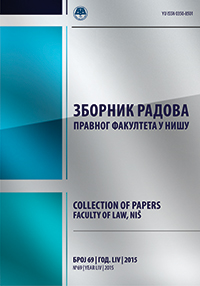ПАРЛАМЕНТАРНА ВЛАДА: МОГУЋНОСТИ РАВНОТЕЖЕ
У СИСТЕМУ ПОДЕЛЕ ВЛАСТИ
THE SYSTEM OF PARLIAMENTARY GOVERNMENT: THE POSSIBILITY OF
BALANCE UNDER THE PRINCIPLE OF THE SEPARATION OF POWERS
Author(s): Irena PejićSubject(s): Constitutional Law
Published by: Правни факултет Универзитета у Нишу
Keywords: Parliamentary system; separation of powers; Parliament; executive authority
Summary/Abstract: The minimum consensus in defining the concept of a parliamentary system is closely related to the presence of the responsible government in the system governed by the principle of the separation of powers, which is the essential characteristic of parliamentarism. A constitutional and political theory classify this system as a model of parliamentary government that is elected by Parliament and responsible to Parliament, which is the essence and the common denominator of this system. Moreover, all the modalities of the system develop in line with the relations established between the legislative and the executive authorities, i.e. between the head of state, the government and the parliament. Nowadays, there is no “pure” model of the parliamentary government, for at least two reasons. First, modern constitutions set up instruments of rationalization and transfer the focus of the constitutional power either to the government or to the head of state, but in any case “away from” the parliament. Second, political framework of modern parliamentarism significantly contributes to the situation where the constitutional instruments aimed at preserving the balance receive a new legal and political meaning; thus, they serve some functions other than those prescribed by the constitution.
Journal: Зборник радова Правног факултета у Нишу
- Issue Year: LV/2016
- Issue No: 73
- Page Range: 67-86
- Page Count: 19
- Language: Serbian

